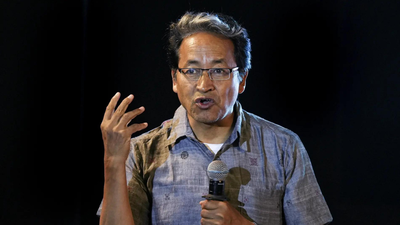A young girl with big dreams, who wanted to study for as long as the family could afford it — this is how 16-year-old Sailaja’s brother remembers her.
“She made our father promise that he would not insist on her getting married until she completes higher education. She used to talk about science and engineering courses,” says C Navneet, her brother.
Her dreams came crashing after she got food poisoning at the government-run residential school where she was studying — in Wankidi Mandal in Telangana’s Komaram Bheem Asifabad district.
 Sailaja with her brother
Sailaja with her brother
She was among 60 students to have fallen ill after lunch on October 28 at the ST Ashram School, run by the Telangana Social Welfare Residential Educational Institutions Society (TSWREIS). After a month of hospitalisation, she died on November 25.
TSWREIS runs 268 residential educational institutions that cater to students from Scheduled Caste, Scheduled Tribe, Backward Classes, and minority communities. The schools are under intense scrutiny after the deaths of 49 students over the course of this year — 30 from suicide, five due to food poisoning, and 14 because of other illnesses.
But it is Sailaja’s death that has perhaps shaken the system the most, with Chief Minister A Revanth Reddywho also holds the education portfolio, pulling up District Collectors and education officers.
The state government has ordered the setting up of committees to address incidents of food poisoning even as two Telangana ministers claimed the deaths were linked to a conspiracy hatched by the opposition BRS.
Story continues below this ad
‘Complaints earlier too’
Choudhary Tukaram, Sailaja’s father, accuses her school of negligence. He says that after several students started vomiting on October 28, the school took them to the hospital without informing the parents immediately.
“There were complaints earlier, too, about the quality of food. As my daughter’s condition worsened, they took her the next day to Mancherial government hospital and called us at 3 pm. Two days later, they moved her to NIMS (Nizam’s Institute of Medical Sciences), Hyderabad. She died after battling for her life for 17 days. She was in class 9,” says Tukaram, a resident of Bada village. He is a farmer with two acres of land where he grows cotton and corn alternatively.
Sailaja is among a handful of girls from the Mali community, which comes under category D of the Backward Classes list in the state, to go to school. “We lost a bright girl from our community to the school’s negligence,” Tukaram says.
Four other students from TSWREIS schools have died of food poisoning — C Prashant from the SC Welfare School in Yadadri Bhuvanagiri district (April 17); G Aditya from the Boys Model School in Jagtial district (July 7); Gangotri from the Tribal Ashram School, Adilabad (October 27); and Thodasam Maheshwari, also from Adilabad school (February 29).
Story continues below this ad
An official from the Directorate of School Education said cooks and food servers were not following standard operating procedures. “Rules, procedures, and guidelines have been issued for food to be prepared under hygienic conditions. However, some people do not follow these, which leads to food poisoning incidents,” the official said.
On the large number of suicide deaths, an official said there were many reasons behind it, with loneliness being a key one.
On Wednesday, a 14-year-old died by suicide in his hostel room. He had recently been admitted at Maddanapur Residential School for Boys in Wanaparthy district.
“On Tuesday, the boy called up his father and asked him to take him away as he had suffered a minor injury while playing kabbadi. His father tried to counsel him to stay as he had only recently joined the school, but the boy was adamant. His father promised to send his uncle in a few days to fetch him, but the boy took the extreme step the next morning,” said inspector Shekar Reddy.
Story continues below this ad
Politics over deaths
Even as the CM issued a strong response following Sailaja’s death, his party has indulged in politicking.
On Thursday, Reddy pulled up District Collectors and Education Department officials and asked them to “treat the students as your own”.
The Telangana government also ordered the setting up of two panels — an institution-level food safety committee and a task force committee.
But Telangana Women and Child Welfare Minister D Anasuya and BC Welfare Minister Ponnam Prabhakar said on Friday that there was a conspiracy, allegedly by the opposition BRS, behind the food poisoning cases in residential schools and hostels.
Story continues below this ad
“Some of the employees in these residential schools and hostels have connections with the BRS. We strongly suspect that they are sabotaging the food preparation and distribution. To defame the Congress government, they are playing politics with the lives of schoolchildren. Why are these incidents happening in spite of giving clear instructions and guidelines on preparing food in hygienic places? Who are these people who are violating the rules? They will be identified and will be dealt with as per the law,” Anasuya claimed.
Prabhakar said the number of food poisoning incidents indicated a conspiracy. “Sinister forces are at work to defame our government. Some of the employees in the residential schools and hostels are related to BRS leaders. Our suspicion is on them for spoiling the meals of children. We are in the process of identifying them and we will deal with them,” he said.
Speaking to The Indian ExpressBRS leader Dasoju Sravan denied the allegations, saying the Congress government was trying to cover up the issue.
“It is insane, inhuman, and callous of Congress ministers to link food poisoning with employees allegedly close to BRS leaders. They are miserably trying to cover up a lack of regular inspections of kitchens and food quality checks. If food poisoning is linked to employees with BRS links, what about the huge number of suicides? This is heights of stupidity and lack of empathy, because all these students are from the marginalised classes,” Sravan said.






